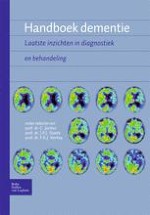2009 | OriginalPaper | Hoofdstuk
19 Frontotemporale dementie (FTD)
Auteurs : H. Seelaar, Y.A.L. Pijnenburg, J.C. van Swieten
Gepubliceerd in: Handboek dementie
Uitgeverij: Bohn Stafleu van Loghum
Kernpunten
-
Frontotemporale dementie (FTD) is een verzamelnaam voor de gedragsvariant FTD, semantische dementie, progressive non-fluent aphasia en FTD met motorisch voorhoornlijden.
-
FTD is klinisch, genetisch en pathologisch een heterogene ziekte.
-
Aanvullend onderzoek bij verdenking op FTD bestaat uit neuropsychologisch onderzoek, beeldvorming van de hersenen (MRI of SPECT/PET) en eventueel liquor- en DNA-Diagnostiek.
-
FTD is erfelijk in ongeveer 30% van de gevallen, waarbij mutaties in het microtubule-associated protein tau (MAPT) of het Progranuline (GRN) gen gevonden kunnen worden.
-
De definitieve diagnose is alleen met hersenobductie te bevestigen, waarbij tau positieve of ubiquitine en TDP-43-positieve inclusies gevonden kunnen worden.
